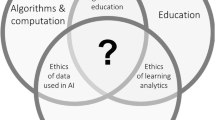Abstract
This paper is concerned with answering thequestion: ``How can business ethics be taught tostudents so that effective learning takesplace?'' It is the contention of this paperthat the question is best answered by focusingon six areas important to teaching businessethics: goals, relevancy, experientialpedagogy, classroom climate, debriefing, andoutcomes assessment.
Similar content being viewed by others
REFERENCES
Brinkmann, J. and R. R. Sims: 2001, 'Stakeholder-Sensitive Business Ethics Teaching', Teaching Business Ethics 5, 191–193.
Colby, A. and L. Kohlberg: 1987, The Measurement of Moral Judgment: Theoretical Foundations and Research Validations, and Standard Issues Scoring Manual, Vols.1 and 2, Cambridge University Press, Cambridge, MA.
Daft, R. L.: 1989, Organization Theory West Publishing Company, New York.
Forbes, M. S.: 1987, 'Fact and Comment', Forbes 140(4), 17–19.
Gandz, J. and N. Hayes: 1988, 'Teaching Business Ethics', Journal of Business Ethics 7, 657–669.
Goldstein, I. L.: 1986, Training in Organizations: Needs Assessment, Development, and Evaluation (2nd ed.), Brooke/Cole, Pacific Grove, CA.
Harvery, B. et al. (eds.): 1994, European Casebook on Business Ethics, Prentice-Hall, New Yor k.
Hemmasi, M. and L. A. Graf: 1992, 'Managerial Skills Acquisition: A Case for Using Business Policy Simulations', Simulation & Gaming 23(3), 298–310.
Johannesen, R. L.: 1990, Ethics in Human Communication (3rd ed.), Waveland, Prospect Heights, IL.
Kilpatrick, D. L.: 1977, 'Evaluating Training Programs: Evidence vs. Proof', Training and Development Journal 31, 9–12.
Kolb, D.: 1984, Experiential Learning: Experience as the Source of Learning, Prentice-Hall, Englewood Cliffs, NJ.
Loeb, S. E.: 1991, 'The Evaluation of “Outcomes” of Accounting Ethics Education', Journal of Business Ethics 10, 77–84.
Makay, J. J. and W. R. Brown: 1972, The Rhetorical Dialogue, Brown, Dubuque, IA.
McDonald, G. M. and G. D. Donleavy: 1995, 'Objections to the Teaching of Business Ethics', Journal of Business Ethics 10(1), 829–835.
McKee, A. and S. M. Schor: 1994, 'Confronting Prejudice and Stereotypes: A Teaching Model', Journal of Management Education 18(1), 447–467.
Oddo, A. R.: 1997, 'A Framework for Teaching Business Ethics', Journal of Business Ethics 16, 293–297.
Pagano, A. M.: 1987, 'Criteria for Ethical Decision Making in Managerial Situations', Proceedings, National Academy of Management, New Orleans, pp. 1–2.
Pearson, M. and D. Smith: 1986, 'Debriefing in Experience-Based Learning', Simulation/Games for Learning, 16(4), 155–172.
Sanyal, R. N.: 2000, 'Teaching Business Ethics in International Business', Teaching Business Ethics 4, 137–149.
Sims, R. R. and S. J. Sims: 1991, 'Increasing Applied Business Ethics Courses in Business School Curricula', Journal of Business Ethics 10, 211–219.
Thatcher, D.: 1986, 'Promoting Learning Through Games and Simulations', Simulations/Games for Learning 16(4), 144–154.
Weber, J. and S. M. Glyptis: 2000, 'Measuring the Impact of a Business Ethics Course and Community Service Experience on Students' Values and Opinions', Teaching Business Ethics 4, 341–358.
Weber, J.: 1990, 'Measuring the Impact of Teaching Ethics to Future Managers: A Review, Assessment, and Recommendations', Journal of Business Ethics 9, 183–190.
Zoellers, F. E. and T. L. Fort: 1996, 'Total Quality Management in the Classroom', Journal of Legal Studies Education 2, 273–290.
Author information
Authors and Affiliations
Rights and permissions
About this article
Cite this article
Sims, R.R. Business Ethics Teaching for Effective Learning. Teaching Business Ethics 6, 393–410 (2002). https://doi.org/10.1023/A:1021107728568
Issue Date:
DOI: https://doi.org/10.1023/A:1021107728568




